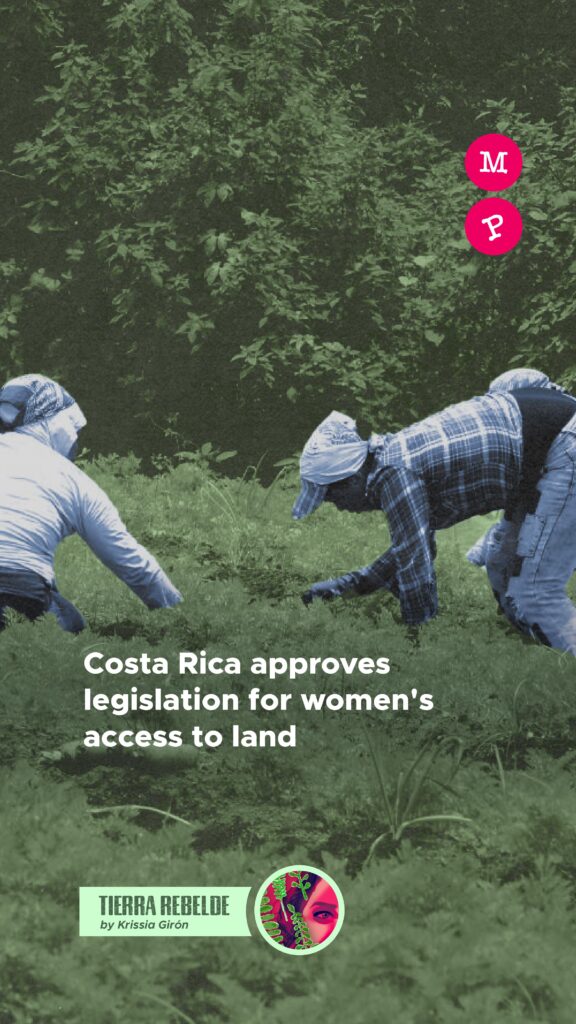
A new bill, which provides women access to land, was presented in June 2024 in the Legislative Assembly of Costa Rica, a country where only 8.1% of women producers have property titles for agricultural purposes according to the 2015 National Agricultural Census.
The Law Land for Women was approved at the end of April of this year, after its second debate, with 41 votes in favor. During the debate, independent representative Kattia Cambronero Aguiluz said that men hold 90% of property titles, so incorporating Costa Rican rural women and providing them with land could contribute to improving the country’s Gross Domestic Product.
«What this project aims to do is provide land so that women can use it as a productive asset and improve their living conditions,» she told the Assembly.
The objective of the project is to guarantee rural women’s ownership, access, use, and control over the land and other rural assets. It is «an effective action to contribute to equality, rural well-being, and democracy, ensuring that rural, agrarian, and environmental planning seeks a rational and sustainable qualitative and quantitative distribution of land resources between men and women.»
Article 41, of this bill, establishes a Land Fund, which seeks to «promote and ensure that young people, ethnic minorities, women and people with disabilities have access to land resources for productive or service purposes, particularly organized groups of these populations, for which at least fifty percent (50%) of the financial resources of the Land Fund will be allocated.»
The law also promotes female employment in low-carbon, conservation, and forestry production systems, which means women will be able to access activities aligned with sustainability and environmental stewardship.
It also includes temporary special measures in line with the Convention on the Elimination of All Forms of Discrimination against Women (CEDAW), such as the gender perspective as a cross-cutting theme in all productive activities, promoting women’s participation in decision-making, access to financing, technical training, and support and social protection services.
The law encourages the organization of women in business and community associations, especially cooperatives and women’s associations with sustainable environmental projects. It recognizes the role of women in food security, environmental conservation, and the transmission of traditional knowledge.
According to the Agricultural Census, in 2015, there were 12,598 registered women producers, representing 15.6% of the total number of producers nationwide.
However, in this country, as throughout the region, thousands of women work the land without receiving a single colon. They grow crops to feed their families, feed their livestock, and make other products such as cheese, bread, and handicrafts, which they then sell informally. This work, and its contribution to the protection of nature and the sustainable use of resources, remains invisible.
The Agricultural Census indicates that 72.8% of women working on farms do not receive any type of remuneration, since it is seen as an extension of unpaid household work and not as a productive activity within the farm.
The structural barriers women face in Costa Rica to accessing land remain prevalent. The fact that less than 10% of them own their land limits the personal and family development and productive potential of the rest. The report “They feed the world”, prepared by We Effect and LATFEM, indicates that in Latin America, although 70% of rural women have access to land, only 30% have the deeds in their name.
«Instead of owning the land they work, they often borrow it, rent it, or have it in the name of their husband, who has left the woman a small plot of land to experiment with,» the study states.

| Cookie | Duración | Descripción |
|---|---|---|
| cookielawinfo-checkbox-analytics | 11 months | This cookie is set by GDPR Cookie Consent plugin. The cookie is used to store the user consent for the cookies in the category "Analytics". |
| cookielawinfo-checkbox-functional | 11 months | The cookie is set by GDPR cookie consent to record the user consent for the cookies in the category "Functional". |
| cookielawinfo-checkbox-necessary | 11 months | This cookie is set by GDPR Cookie Consent plugin. The cookies is used to store the user consent for the cookies in the category "Necessary". |
| cookielawinfo-checkbox-others | 11 months | This cookie is set by GDPR Cookie Consent plugin. The cookie is used to store the user consent for the cookies in the category "Other. |
| cookielawinfo-checkbox-performance | 11 months | This cookie is set by GDPR Cookie Consent plugin. The cookie is used to store the user consent for the cookies in the category "Performance". |
| viewed_cookie_policy | 11 months | The cookie is set by the GDPR Cookie Consent plugin and is used to store whether or not user has consented to the use of cookies. It does not store any personal data. |